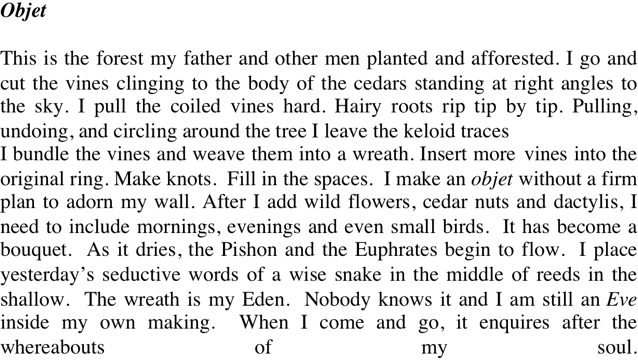Annie Christain – Dragon Ball Z Censored for an American Audience: “One Night in Beijing”
Annie Christain is an assistant professor of composition and ESOL at SUNY Cobleskill with poems appearing in Seneca Review, Oxford Poetry, The Chariton Review, and The Lifted Brow, among others. She received the grand prize of the 2013 Hart Crane Memorial Poetry Contest, the 2013 Greg Grummer Poetry Award, the 2015 Oakland School of the Arts Enizagam Poetry Award, and the 2015 Neil Shepard Prize in Poetry. Additional honors include her being selected for the Shanghai Swatch Art Peace Hotel Artist Residency and the Arctic Circle Autumn Art and Science Expedition Residency.
Dragon Ball Z Censored for an American Audience: “One Night in Beijing”
I seek out a woman so I can talk to her about her breasts,
and she says it’s brave of me to claim I see them.
She’s been growing flowers with her husband for years,
and she talks about the flowers like they’re the land of the dead,
like she’s afraid to get lost at midnight around them.
It’s decided it’s more acceptable for me to scrub her back.
She says: They’ll drink the blood but with flower roots in their hair.
She means her husband is tending to the flowers
while lying on his side. I’m scrubbing her too hard but can’t stop.
Before this, I forgot dirt exists under cement roads.
To be more specific,
we’re both standing in Baihuashenchu Alley,
her back to me, no water. I’m just using a hairbrush on her back.
Harder, she screams.
Her hair takes on the quality of roots,
and I see now the tips are actually in the dirt.
How is there not any blood on her back?
But what’s in the ground is lapping up liquid.
We’re in this alley, and I see the key-maker
who’s sitting on his stool—he opens his mouth and a fly comes out.
I forgot what I did to her husband with my hands
prior to her smearing him with the paint roller.
She bends down to moan and breathe near him to simulate life.
She can travel any distance with her hair still in the soil.
I can’t get her skin tone right
after I realize she has a back where her chest should be.
When I saw her yesterday tending to the flowers with her husband
but looking at me for too long, I saw her shirt said HFIL,
but any kid can tell that it used to be HELL.
I look again, and just for a second I see a shadow
is actually a decapitated dinosaur. This place is too much.
Are they timeless beings or just scientists who can bend light around objects?
I want to call her a gender neutral term,
so I say “elderly person,” and that feels right.
The grieving souls—wolves waiting for me at the gate
cascade up, a hideous arch. Frozen or displayed,
they end at the wall in a pile.
I am now where artists get their ideas.
She says: I picked this to be the last thing you see.
I’m not dying; I’m going to another dimension,
but I must leave everything here.
Continue reading

